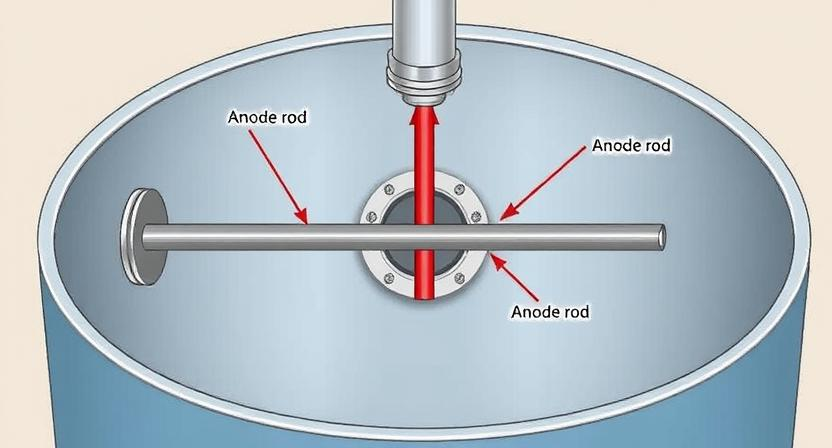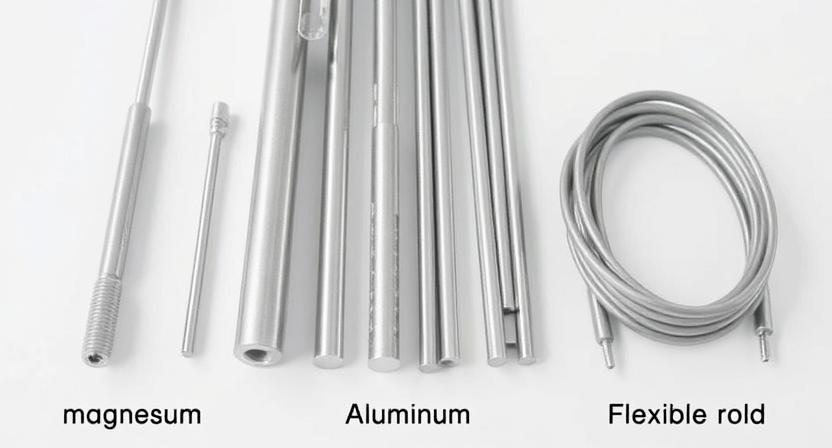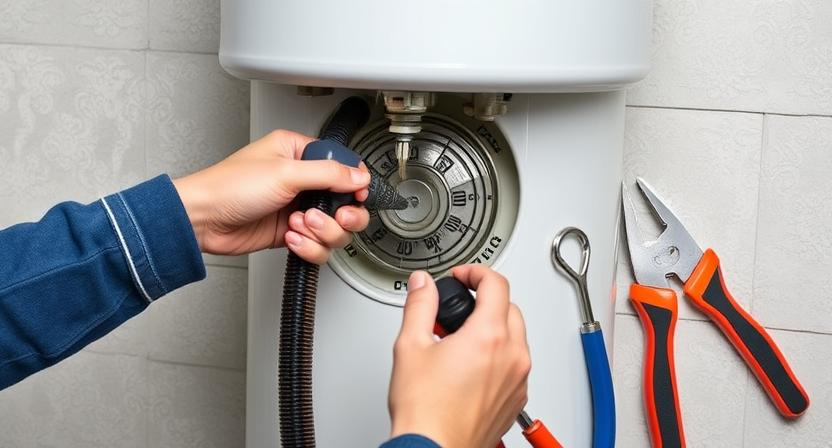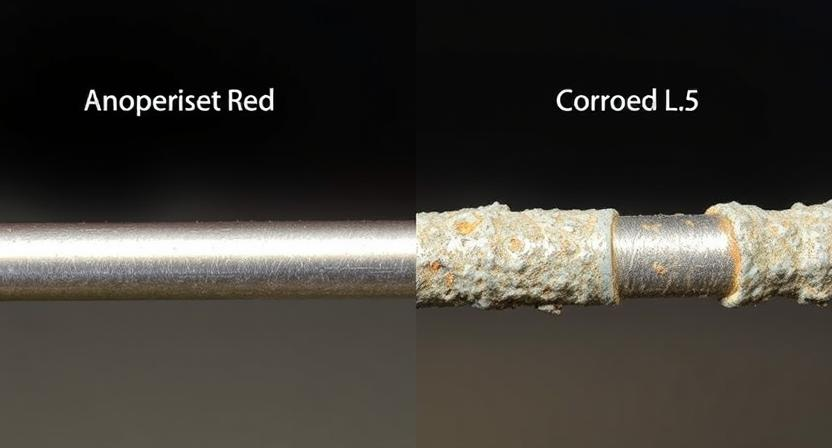When it comes to maintaining your water heater, the anode rod is an unsung hero. This often-overlooked component plays a vital role in preventing corrosion inside your water heater tank. It essentially acts as a sacrificial component, designed to deteriorate over time to protect the more expensive parts of your water heater. Without it, your water heater would be susceptible to rust and corrosion, which could lead to costly repairs or replacements. But not all anode rods are created equal. In this article, we'll explore the benefits of using a flexible anode rod and why it might be the best choice for your water heater. Understanding the importance of an anode rod can help you make informed decisions about the maintenance and longevity of your water heater system.

An anode rod is a long metal rod that sits inside your water heater tank. It's designed to attract corrosive elements in the water that would otherwise attack the tank itself. This rod undergoes a process called electrolysis, where it sacrifices itself to ensure the integrity of the tank. By sacrificing itself, the anode rod protects the steel tank from rusting, thereby extending the life of your water heater. This is crucial because water heater tanks are often made of steel, which is prone to rusting when exposed to water over time. The presence of an anode rod is a cost-effective measure that can save homeowners significant amounts of money and hassle in the long run.
There are several types of anode rods available, each with its unique properties and benefits. Understanding these differences can help you choose the best one for your specific needs:
Magnesium Anode Rods: Known for their effectiveness in soft water conditions, magnesium anode rods produce a higher voltage, which makes them more efficient in attracting corrosive elements. They are often recommended for households with low mineral content in their water supply.
Aluminum Anode Rods: Often used in areas with hard water, aluminum rods are less reactive but can last longer than magnesium rods. They are generally more affordable and can handle higher levels of minerals without deteriorating as quickly.
Aluminum Zinc Alloy Anode Rods: Commonly used to combat the sulfur smell in water, these rods are a blend designed to address specific water quality issues. They are particularly useful in areas where the water has a high sulfur content, which can cause a rotten egg smell.
Flexible Anode Rods: Made from magnesium or aluminum, these rods are designed to fit into tight spaces, making them ideal for water heaters in cramped locations. Their segmented design allows for easier installation and adjustment, which is particularly beneficial for homeowners with limited access to their water heater.

Flexible anode rods are an excellent choice for many water heaters, especially those located in tight spaces or those with low ceilings. Their design offers unique advantages that traditional rigid anode rods cannot match.
Traditional anode rods are long and rigid, making them difficult to install in tight spaces. A flexible anode rod, on the other hand, is made of segments that are connected with flexible joints. This design allows the rod to bend, making installation in confined spaces much easier. This ease of installation is especially beneficial for homeowners who may not have the expertise or tools required for installing a traditional anode rod. Moreover, the flexibility reduces the risk of damaging the rod during installation, which can lead to more effective protection of the water heater tank.
Flexible anode rods are available in both magnesium and aluminum varieties, making them suitable for a range of water conditions. Whether you're dealing with soft water, hard water, or a sulfur smell, there's a flexible anode rod to meet your needs. This versatility means that regardless of your specific water quality issues, you can find a flexible anode rod that will offer optimal protection. Furthermore, their adaptability ensures that even as water conditions change, your water heater remains protected, reducing the need for frequent replacements.
By choosing the right material for your water conditions, a flexible anode rod can provide enhanced protection against corrosion. For example, a flexible magnesium anode rod is ideal for soft water, while a flexible aluminum anode rod is better for hard water conditions. This tailored approach ensures that the rod functions at its best, providing maximum corrosion resistance. Additionally, the segmented design allows for a more even distribution of the sacrificial material, ensuring consistent protection across the water heater tank.
The collapsible nature of a flexible anode rod means it can be installed in water heaters where space is at a premium. This makes it an ideal solution for homes with limited access to the water heater or those with unconventional setups. In modern homes where utility spaces are often compact, the space-saving design of flexible anode rods can be a significant advantage. This feature not only facilitates installation but also allows for easier maintenance and replacement in the future, enhancing the overall convenience for homeowners.
Replacing an anode rod is a straightforward process, but it does require some basic tools and safety precautions. Understanding the steps involved can ensure a smooth and efficient replacement process, minimizing downtime and ensuring continued protection for your water heater.

To replace a flexible anode rod, you'll need a few essential tools:
Socket Wrench: Necessary for loosening and tightening the anode rod.
Teflon Tape: Used to wrap around the threads of the new rod to ensure a good seal.
Pipe Sealant: Helps prevent leaks at the connection points.
Bucket: Useful for catching any water that may spill during the process.
Hose (optional): Can be used to direct water from the drain valve to a suitable drainage location.
Turn Off Power and Water: For electric water heaters, switch off the power at the circuit breaker. For gas water heaters, set the thermostat to the pilot setting. Turn off the cold water supply. This step is crucial for safety and to prevent accidental spills.
Drain a Few Gallons of Water: Connect a hose to the drain valve and release a few gallons of water from the tank. This will prevent any spills when you remove the anode rod. Draining some water also reduces pressure in the tank, making it easier to remove the rod.
Locate the Anode Rod: The anode rod is typically located on the top of the tank. You may need to remove a plastic cap to access it. Identifying the correct location is important to avoid unnecessary disassembly of other components.
Remove the Old Anode Rod: Use a socket wrench to unscrew the old anode rod. Be prepared for it to be heavy if it's heavily corroded. Removing the rod may require some force, especially if it has been in place for a long time.
Prepare the New Flexible Anode Rod: Wrap Teflon tape around the threads of the new rod to ensure a good seal. Proper preparation of the new rod is essential to prevent leaks and ensure a secure fit.
Install the New Rod: Carefully insert the new flexible anode rod into the tank. Tighten it with the socket wrench, ensuring it is secure. The flexibility of the rod can make this step easier, especially in tight spaces.
Restore Power and Water: Turn the water supply back on and let the tank fill completely before restoring power or relighting the pilot. This step ensures the water heater is ready for operation without any risk of damage.
Check for Leaks: Once the tank is full and powered, check the area around the anode rod for any leaks. Inspecting for leaks is a crucial final step to ensure the installation was successful and that the system is operating correctly.
Regular maintenance of your anode rod can extend the life of your water heater. By keeping an eye on this crucial component, you can prevent potential issues and ensure your water heater operates efficiently.

It's a good idea to check the condition of your anode rod every two to three years. If you live in an area with hard water, you may need to check it more frequently. Regular inspections can help you catch problems early, allowing for timely replacements before significant damage occurs. Consistent maintenance can also help you better understand your water heater's needs, leading to more effective care and management.
If the anode rod is less than half an inch thick or coated with calcium, it's time to replace it. A heavily corroded rod won't be able to protect your tank effectively. Keeping an eye out for these signs ensures that your water heater remains protected and operates at peak efficiency. By addressing wear and tear promptly, you can avoid more extensive and costly repairs down the line.
If you notice a rotten egg smell in your water, consider switching to an aluminum zinc anode rod. This type of rod can help reduce the sulfur smell that sometimes occurs with magnesium rods in certain water conditions. Adjusting your anode rod to match specific water quality issues can enhance the performance and longevity of your water heater. Understanding how different anode rod materials interact with your water can lead to a more tailored and effective maintenance strategy.
Flexible anode rods are widely available at home improvement stores like Lowe's and Home Depot. You can also find them online through various retailers. When purchasing, ensure you choose the right material for your water conditions and the correct size for your water heater. Shopping around can also help you compare prices and find the best deal for your needs. By investing in a quality flexible anode rod, you can ensure long-term protection and efficiency for your water heater.
A flexible anode rod offers numerous benefits, including easy installation, versatility, and enhanced protection for your water heater. Regular maintenance and timely replacement of your anode rod can significantly extend the lifespan of your water heater, saving you money in the long run. By choosing a flexible anode rod, you can address specific challenges posed by tight spaces or varying water conditions, ensuring your water heater operates at its best. Whether you're dealing with tight spaces or specific water conditions, a flexible anode rod is a smart investment for any homeowner. By understanding and utilizing the benefits of flexible anode rods, you can ensure your water heater operates efficiently and effectively for years to come, providing peace of mind and consistent performance.